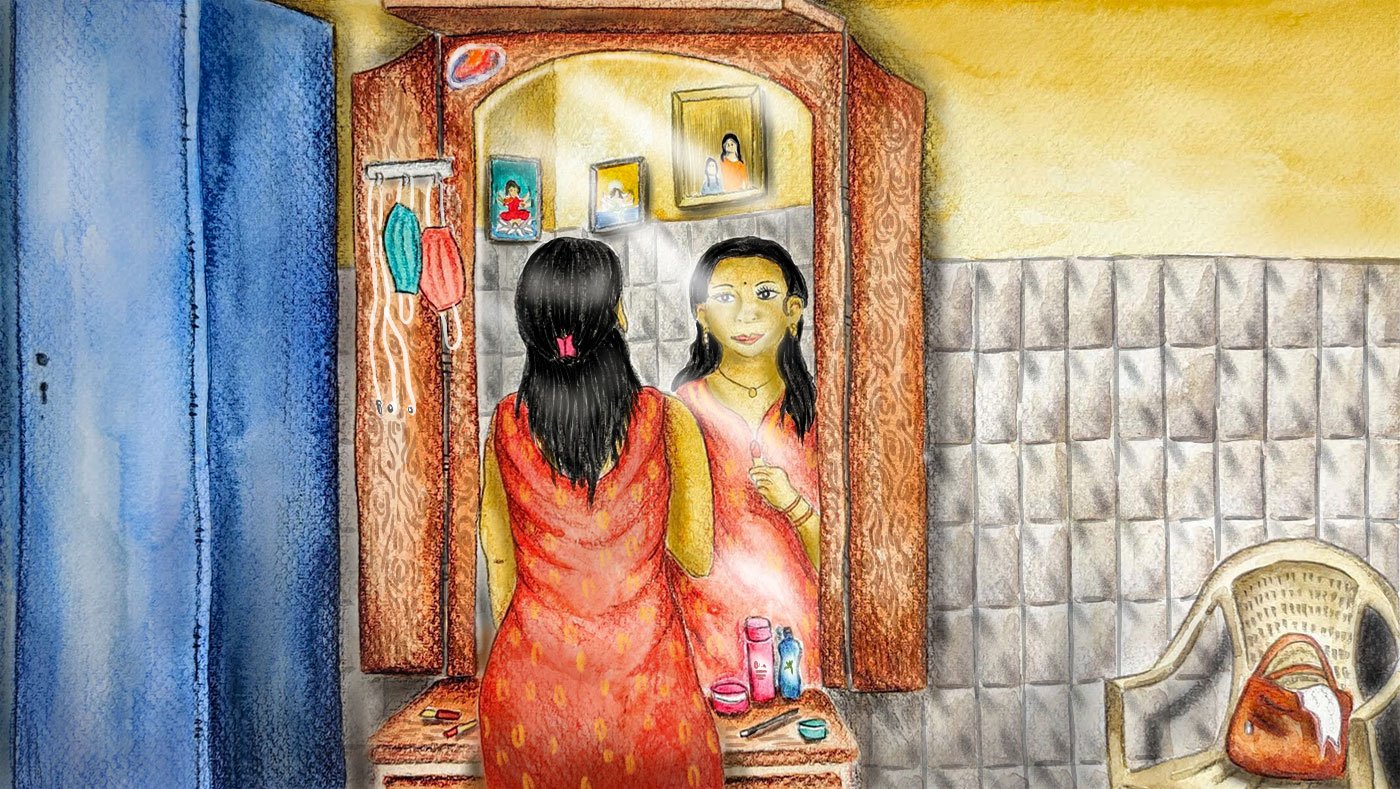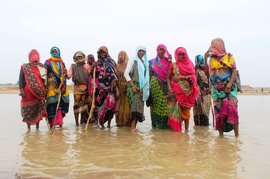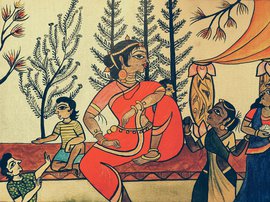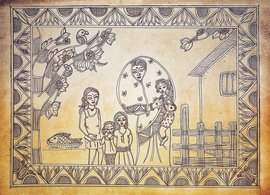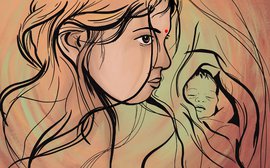It’s 10:30 on a Sunday morning and Honey is getting ready for work. Standing in front of a dressing table, she carefully applies scarlet lipstick. “This will match well with my suit,” she says, as she rushes to feed her seven-year-old daughter. On the dressing table are slung a handful of masks and a pair of earphones. Cosmetics and make-up items lie unarranged on the table-top, while the mirror reflects photographs of gods and relatives hung in one corner of the room.
Honey (name changed) is getting ready to meet a client in a hotel some 7-8 kilometres from her home – a one-room set in a basti in New Delhi’s Mangolpuri locality. She is around 32 years old and a sex worker by profession, working in the nearby Nangloi Jat area of the capital. She is originally from rural Haryana. “I came 10 years ago and now I belong here. But my life has been a series of misfortunes since coming to Delhi.”
What sort of misfortunes?
“Four miscarriages toh bahut badi baat hai [are a very big thing]! They were for me, when I had no one to feed me, look after me and take me to a hospital,” says Honey with a smirk, signalling that she has come a long way on her own.
“This was the only reason why I had to take up this work. I had no money to eat and feed my child, who was still inside me. I had conceived for the fifth time. My husband had left me while I was just two months pregnant. Following a series of incidents arising from my illness, my boss threw me out of the factory I worked in, which made plastic containers. I used to earn 10,000 rupees a month there,” she says.
Honey’s parents married her off at age 16 in Haryana. She and her husband remained there a few years – with him working as a driver. They moved to Delhi when she was around 22. But once there, her alcoholic husband kept disappearing often. “He would be gone for months. Where? I don’t know. He still does that and never tells. Just moves away with other women and returns only when he is out of money. He works as a food service delivery agent and spends mostly on himself. That was the main reason I had four miscarriages. He would just not bring me any medicines that I needed, nor nutritious food. I used to feel very weak,” she adds.
!['I was five months pregnant and around 25 when I began this [sex] work', says Honey](/media/images/02-IMG_9965-JM-Clients_even_in_my_ninth_mo.max-1400x1120.jpg)
'I was five months pregnant and around 25 when I began this [sex] work', says Honey
Now Honey lives with her daughter in their home in Mangolpuri, for which she pays a rent of Rs. 3,500 a month. Her husband stays with them, but still does his vanishing act every few months. “I tried to survive after losing my job, but just couldn’t. Then Geeta didi told me about sex work and got me my first client. I was five months pregnant – and around 25 years old when I began this work,” she says. She continues to feed her daughter while we talk. Honey’s child studies in Class 2 of a private English-medium school that charges Rs. 600 a month as fees. In the lockdown era, the child attends her classes online, on Honey’s phone. The same one on which her clients contact her.
“Sex work got me enough to pay for the rent and buy food and medicines. I made around 50,000 rupees a month in the initial period. I was young and beautiful back then. Now I have gained weight,” says Honey, bursting into laughter. “I had thought that I would quit this work after my delivery and look for decent employment, even as a
kaamwali
(domestic worker) or sweeper. But destiny had other plans for me.
“I was very eager to earn even during my pregnancy because I did not want a fifth miscarriage. I wanted to give the best possible medication and nutrition to my coming child, which is why I accepted clients even in my ninth month of pregnancy. It used to be very painful but I had no other choice. Little did I know this would lead to new complications in my delivery,” says Honey.
"Being sexually active in the last trimester of pregnancy can be hazardous in many ways,” Dr. Neelam Singh, a Lucknow-based gynaecologist, told PARI. “She could experience a rupture of the membrane and suffer by contracting a sexually transmitted disease. She might undergo premature labour and the child could also get the STD. And if sexual intercourse often happens in early pregnancy, it could lead to abortion. Most times, women in sex work avoid carrying a child. But if they get pregnant, they continue to work, which could sometimes lead to a late and unsafe abortion, risking their reproductive health."
“Once when I went in for a sonography, following unbearable itching and pain,” says Honey, “I got to know that I had an unusual allergy on my thighs, lower abdomen and swelling on the vagina. I felt like killing myself with all that pain and the expenses I knew would follow.” The doctor told her it was a sexually transmitted disease. “But then, one of my clients gave me emotional as well as financial support. I never told the doctor about my profession. That might have been inviting a problem. If she had asked to meet my husband, I would have taken one of my clients to her.
“Thanks to that man, I and my daughter are okay today. He paid half of the bills during my treatment. That is when I decided I could continue with this work,” says Honey.
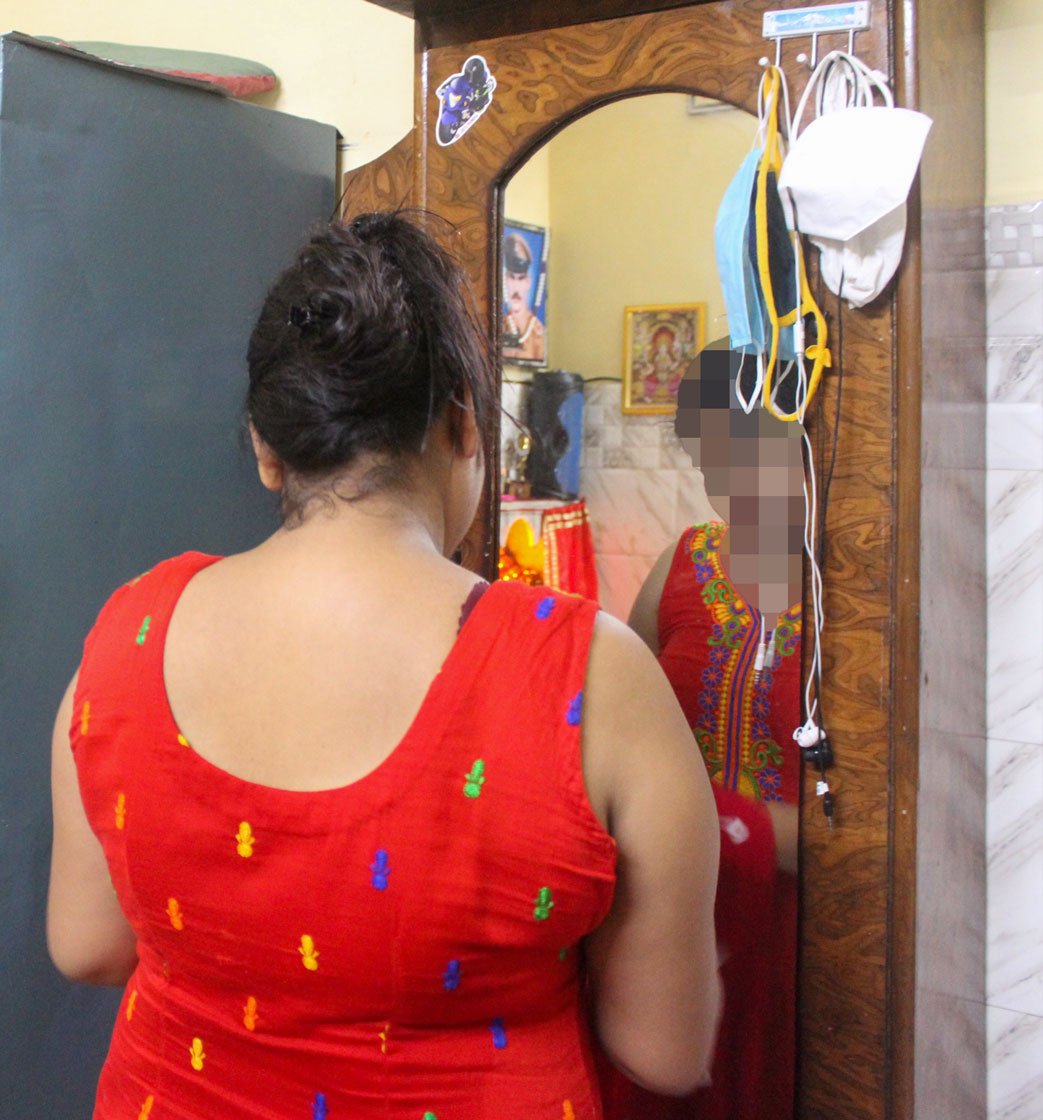
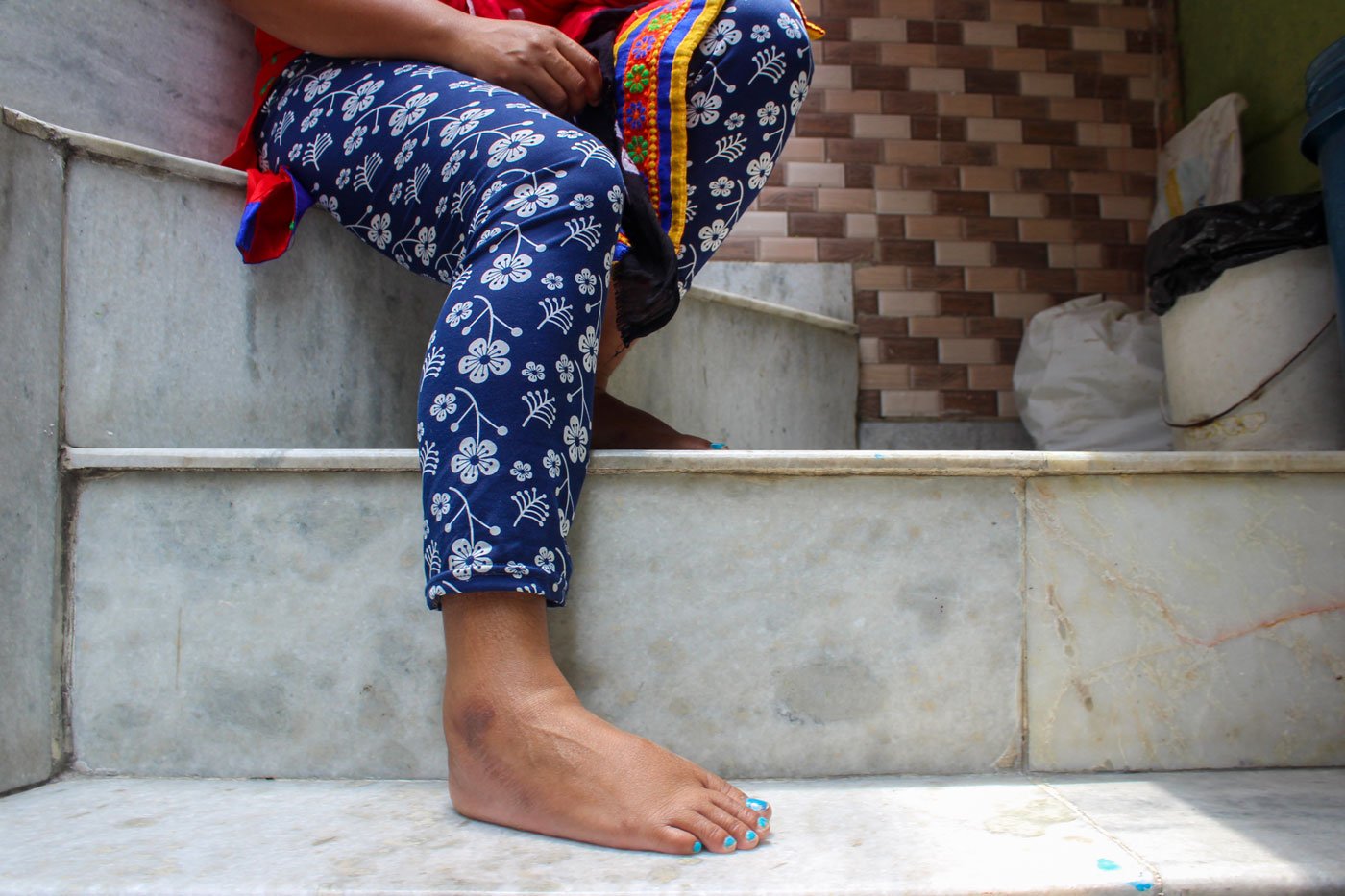
'I felt like killing myself with all that pain and the expenses I knew would follow,' says Honey, who had contracted an STD during her pregnancy
“Many organisations tell them about the importance of using condoms,” says Kiran Deshmukh, coordinator of the National Network of Sex Workers (NNSW). “However, among sex worker women, abortions are more common than miscarriages. But generally, they go to the government hospital where the doctors also neglect them once they get to know of their profession.”
How do the doctors find out?
“They are gynaecologists,” points out Deshmukh, who is also president of the Veshya Anyay Mukti Parishad (VAMP), based in Sangli, Maharashtra. “Once they ask for their address and learn which locality the women are from, they would figure it out. The women are then given dates [for abortion] that often get postponed. And many a time, the doctor eventually declares that abortion is not possible, saying: ‘you have exceeded four months [of pregnancy] and now it would be illegal to abort’.”
Quite a few of the women simply avoid seeking some kinds of medical help at government hospitals. According to a 2007 report from the United Nations Development Programme's Trafficking and HIV/AIDS project, almost “50 per cent of sex workers [surveyed across nine states] reported not seeking services like ante-natal care and institutional delivery from the public health facilities.” Fear of stigma, attitudes, and urgency in the case of deliveries, seem to be among the reasons for that.
“This profession is directly related to reproductive health,” says Ajeet Singh, founder and director of Gudiya Sanstha, a Varanasi-based organisation that has combated sex trafficking for over 25 years. Singh, who has also worked with organisations helping women in Delhi’s GB Road locality, says that in his experience “75-80 per cent of women in sex work have some or the other reproductive health issues.”
“We have all kind of clients,” says Honey, back in Nangloi Jat. “From MBBS doctors to policemen, students to rickshaw pullers, they all come to us. When younger, we only go with people who pay well, but as our age increases, we stop being choosy. In fact, we need to stay on good terms with these doctors and policemen. You never know when you might need them.”
How much does she earn in a month now?
“If we exclude this lockdown period, I was making around 25,000 rupees a month. But that is an approximate number. Payments differ from client to client, depending on their profession. It also depends on whether we spend the entire night, or just hours (with them),” says Honey. “If we have doubts about the client, we don’t go to hotels with them and call them to our place instead. But in my case, I bring them here to Geeta didi’s place in Nangloi Jat. I stay over some nights and days each month, here. She takes half of what the client gives me. That’s her commission.” The amounts vary widely, but her minimum charge for a full night, she says, is Rs. 1,000.
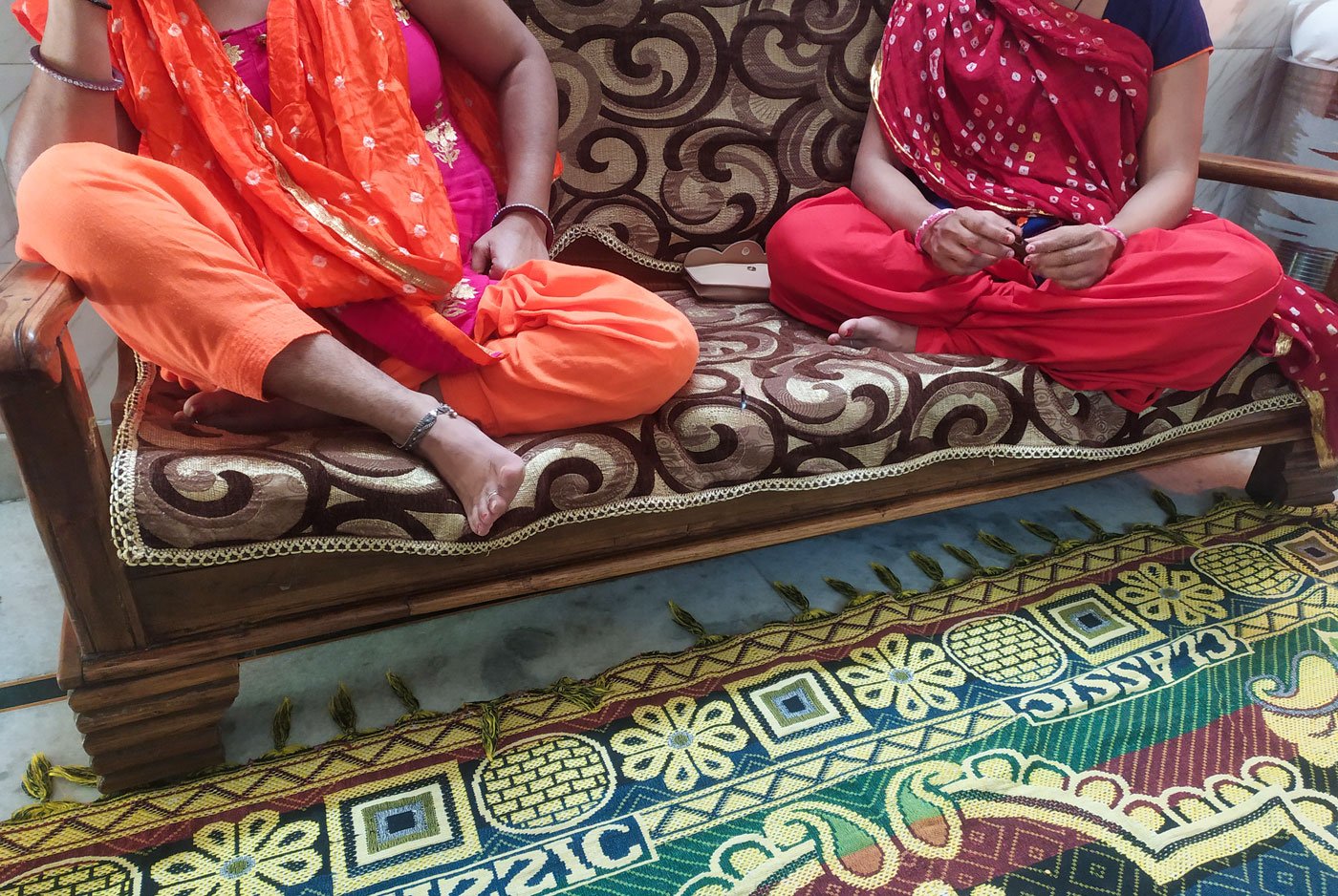
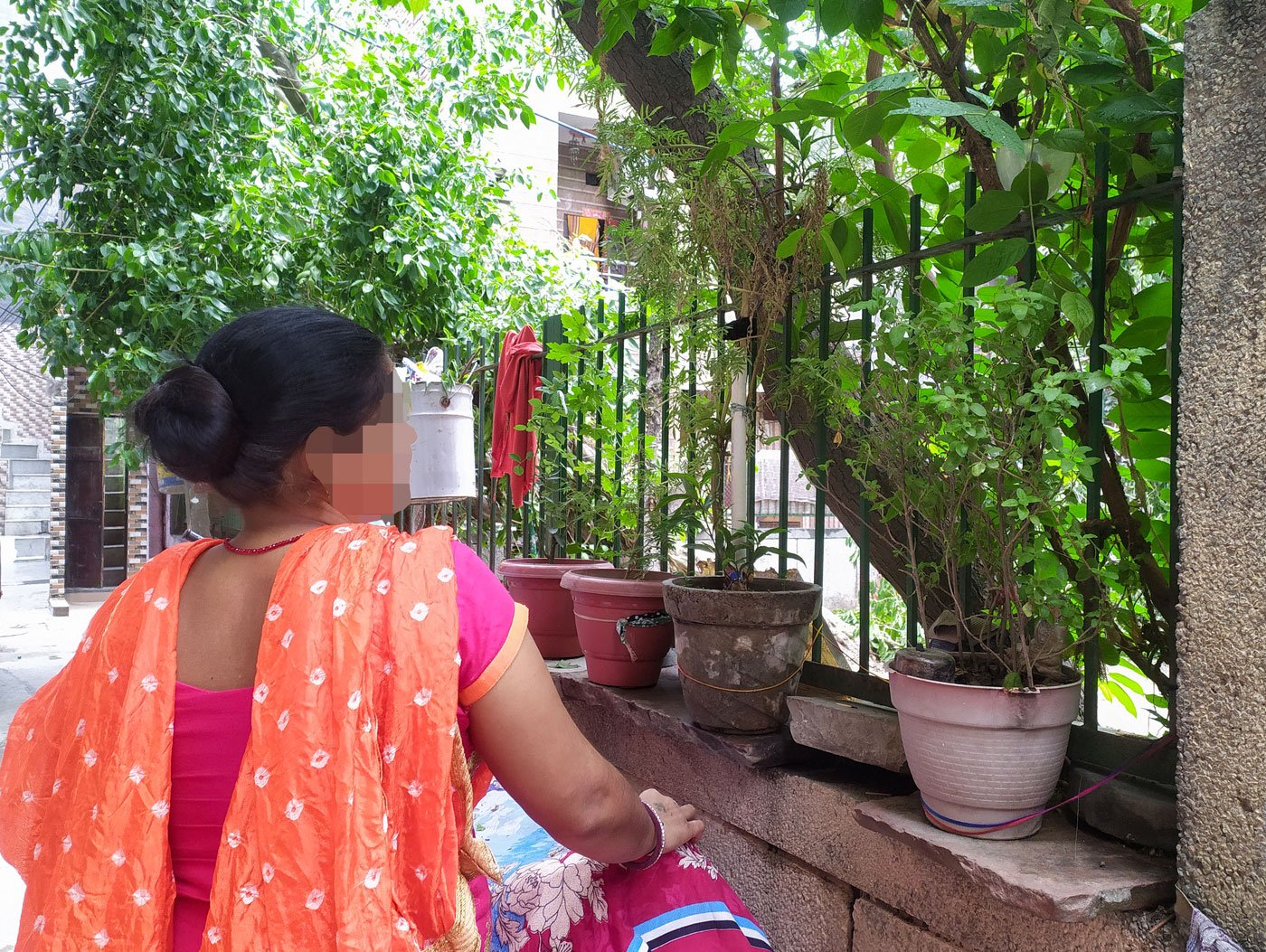
Geeta (in orange) is the overseer of sex workers in her area; she earns by offering her place for the women to meet clients
Geeta, who is in her early 40s, is the overseer of sex workers in her area. She is also in the
deh vyapar
(body business), but mainly makes her living by offering her place to other women and claiming a commission from them. “I bring needy women into this job and when they do not have a place to work, I offer them mine. I take only 50 per cent of their income,” says Geeta simply.
“I have seen a lot in my life,” says Honey. “From working at a plastic factory and being thrown out because my husband left me, to now this fungal and vaginal infection I live with and still take medicines for. It seems destined to be with me forever.” These days, her husband is also living with Honey and their daughter.
Does he know about her profession?
“Very well,” says Honey. “He knows it all. Now he has an excuse to depend on me financially. In fact, today, he is going to drop me to the hotel. But my parents [they are a farming family] have no clue about it. And I would never want them to know. They are very old people, living in Haryana.”
“Under the Immoral Traffic (Prevention) Act, 1956, it is an offence for any person above the age of 18 to live off the earnings of a sex worker,” says Aarthi Pai, Pune-based legal adviser to both VAMP and NNSW. “That could include adult children, partner/husband and parents living with a woman in sex work and dependent on her earnings. Such an individual can be punished with imprisonment up to seven years.” But Honey is very unlikely to act against her husband.
“This is the first time I am going to meet any client after the lockdown ended. There have been few, almost none, these days,” she says. “Those who do come to us now, in this pandemic period, mostly can’t be trusted. Earlier, we only had to take precautions to stay clear of HIV and other [sexually transmitted] diseases. Now, there is this corona too. This entire lockdown has been a curse for us. No earnings at all – and all our savings have gone. I could not even get my medicines [anti-fungal creams and lotions] for two months because we could barely afford the food to survive,” says Honey, as she calls out to her husband to bring out his motorbike and drop her to the hotel.
PARI and CounterMedia Trust's
nationwide reporting project on adolescent girls and young women in rural India
is part of a Population Foundation of India-supported initiative to
explore the situation of these vital yet marginalised groups, through the
voices and lived experience of ordinary people.
Want to republish this article? Please write to [email protected] with a cc to [email protected]
Jigyasa Mishra reports on public health and civil liberties through an independent journalism grant from the Thakur Family Foundation. The Thakur Family Foundation has not exercised any editorial control over the contents of this reportage.
